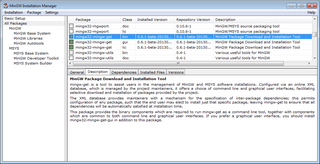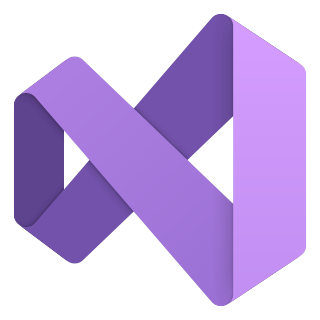
Microsoft Foundation Class Library (MFC) is a C++ object-oriented library for developing desktop applications for Windows.

MinGW, formerly mingw32, is a free and open source software development environment to create Microsoft Windows applications.

Microsoft XNA is a freeware set of tools with a managed runtime environment that Microsoft Gaming developed to facilitate video game development. XNA is based on .NET Framework, with versions that run on Windows and Xbox 360. XNA Game Studio can help develop XNA games. The XNA toolset was announced on March 24, 2004, at the Game Developers Conference in San Jose, California. A first Community Technology Preview of XNA Build was released on March 14, 2006.

jEdit is a free software text editor available under GPL-2.0-or-later. It is written in Java and runs on any operating system with Java support, including BSD, Linux, macOS and Windows.

Windows Installer is a software component and application programming interface (API) of Microsoft Windows used for the installation, maintenance, and removal of software. The installation information, and optionally the files themselves, are packaged in installation packages, loosely relational databases structured as COM Structured Storages and commonly known as "MSI files", from their default filename extensions. The packages with the file extensions mst contain Windows Installer "Transformation Scripts", those with the msm extensions contain "Merge Modules" and the file extension pcp is used for "Patch Creation Properties". Windows Installer contains significant changes from its predecessor, Setup API. New features include a GUI framework and automatic generation of the uninstallation sequence. Windows Installer is positioned as an alternative to stand-alone executable installer frameworks such as older versions of InstallShield and NSIS.
Windows Presentation Foundation (WPF) is a free and open-source graphical subsystem originally developed by Microsoft for rendering user interfaces in Windows-based applications. WPF, previously known as "Avalon", was initially released as part of .NET Framework 3.0 in 2006. WPF uses DirectX and attempts to provide a consistent programming model for building applications. It separates the user interface from business logic, and resembles similar XML-oriented object models, such as those implemented in XUL and SVG.

Lazarus is a cross-platform, integrated development environment (IDE) for rapid application development (RAD) using the Free Pascal compiler. Its goal is to provide an easy-to-use development environment for developing with the Object Pascal language, which is as close as possible to Delphi. It is free and open-source software with different parts released under different software licenses.
Microsoft Build Engine, or MSBuild, is a set of free and open-source build tools for managed code under the Common Language Infrastructure as well as native C and C++ code. It was first released in 2003 and was a part of .NET Framework. MSBuild is included with Visual Studio, but can also be run independently through MSBuild's command-line interface.
Sandcastle is a documentation generator from Microsoft. It automatically produces MSDN-style code documentation out of reflection information of .NET assemblies and XML documentation comments found in the source code of these assemblies. It can also be used to produce user documentation from Microsoft Assistance Markup Language (MAML) with the same look and feel as reference documentation.

MonoDevelop was an open-source integrated development environment for Linux, macOS, and Windows. Its primary focus is development of projects that use Mono and .NET Framework. MonoDevelop integrates features similar to those of NetBeans and Microsoft Visual Studio, such as automatic code completion, source control, a graphical user interface (GUI), and Web designer. MonoDevelop integrates a Gtk# GUI designer called Stetic. It supports Boo, C, C++, C#, CIL, D, F#, Java, Oxygene, Vala, JavaScript, TypeScript, and Visual Basic.NET. Although there is no word from the developers that it has been discontinued, nonetheless, it hasn't been updated in 4 years and is no longer installable on major operating systems, such as Ubuntu 22.04 and above. Its parent Microsoft seems to have shifted focus to Visual Studio Code and the .NET Framework, which runs on many operating systems, including Linux.

Visual Studio is an integrated development environment (IDE) developed by Microsoft. It is used to develop computer programs including websites, web apps, web services and mobile apps. Visual Studio uses Microsoft software development platforms including Windows API, Windows Forms, Windows Presentation Foundation (WPF), Windows Store and Microsoft Silverlight. It can produce both native code and managed code.

C1 CMS is a free open source .NET-based web content management system.
NuGet is a package manager, primarily used for packaging and distributing software written using .NET and the .NET framework. The Outercurve Foundation initially created it under the name NuPack. Since its introduction in 2010, NuGet has evolved into a larger ecosystem of tools and services, including a free and open-source client application, hosted package servers, and software deployment tools.

.NET Compiler Platform, also known by its codename Roslyn, is a set of open-source compilers and code analysis APIs for C# and Visual Basic (VB.NET) languages from Microsoft.
The Outercurve Foundation was an independent 501(c)(6) non-profit corporation founded by Microsoft. Its goal was to "enable the exchange of code and understanding among software companies and open source communities." They ran several software projects, some of which were connected to the .NET Framework.

The Windows Package Manager is a free and open-source package manager designed by Microsoft for Windows 10 and Windows 11. It consists of a command-line utility and a set of services for installing applications. Independent software vendors can use it as a distribution channel for their software packages.
Microsoft, a technology company historically known for its opposition to the open source software paradigm, turned to embrace the approach in the 2010s. From the 1970s through 2000s under CEOs Bill Gates and Steve Ballmer, Microsoft viewed the community creation and sharing of communal code, later to be known as free and open source software, as a threat to its business, and both executives spoke negatively against it. In the 2010s, as the industry turned towards cloud, embedded, and mobile computing—technologies powered by open source advances—CEO Satya Nadella led Microsoft towards open source adoption although Microsoft's traditional Windows business continued to grow throughout this period generating revenues of 26.8 billion in the third quarter of 2018, while Microsoft's Azure cloud revenues nearly doubled.










